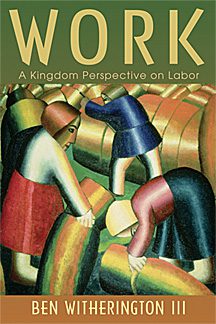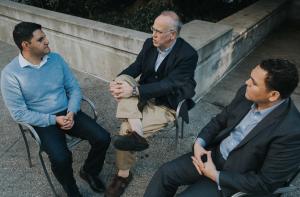I just finished a thoughtful and challenging book by one of my favorite biblical scholars, Ben Witherington III. A top-notch New Testament scholar, Witherington is also an engaging blogger who, I am pleased to say, is part of the Patheos blogging community (see The Bible and Culture). The actual title of the book I just read is Work: A Kingdom Perspective on Labor. In fact, this book is a biblical and theological study of work from a Christian perspective.
 Though I don’t agree with everything Witherington says in this book, I highly recommend it, nevertheless. Part of what I always appreciate about Witherington’s writings is his deep, pervasive, and faithful wrestling with Scripture. He is not just giving us his views on work. Rather, Witherington is trying to help us understand what the Bible reveals about work, from the first chapter of Genesis to the last chapter of Revelation.
Though I don’t agree with everything Witherington says in this book, I highly recommend it, nevertheless. Part of what I always appreciate about Witherington’s writings is his deep, pervasive, and faithful wrestling with Scripture. He is not just giving us his views on work. Rather, Witherington is trying to help us understand what the Bible reveals about work, from the first chapter of Genesis to the last chapter of Revelation.
To encourage you to read Work, let me post a few tantalizing excerpts:
Work was part of the original creation design, and it appears to be in the works for the new creation as well. Work should be neither demonized nor divinized. If we were to contrast for a moment, however, the creation and the eschatological visions of work in the Bible, we could say that in the creation accounts work is what human begins were fitted and commanded to do, whereas in the eschatological accounts it is what the Spirit inspires and gifts them to do, and in which they find joy (xii).
[Concerning our own work,] we must be constantly asking, Is this work that foreshadows the Kingdom and its ends and aims and character? (xv)
It is not the work itself but the toilsomeness of work that was added to the equation as a result of the curse involved in the Fall. (3)
[M]y concern in this study is not merely to rehabilitate our notions of work by correcting bad exegesis of Genesis 1-3. My concern is to ask and answer the question of how work looks different in the light of Kingdom come, how work looks different if one believes Christ has changed the eschatological situation by his coming and that this affects the way we look at all we do as Christians. (4)
[H]ere is an imporant point – our purpose in life involves doing as much as being, and thus it is no wonder that if and when we come to the point of no longer having something meaningful and purposeful to do, something that takes us out of our own comfort zones and away from our pampering and serving ourselves, it is easy to see why we feel purposeless in life. (10)
As it turns out, our American theology of retirement has no real biblical basis, and it leads to despair and longing and a sense of abandonment on the part of those who have been set off in a corner of society and told to hush and just “retire.” (11)
Enough for now. Intrigued? Then go buy the book.












